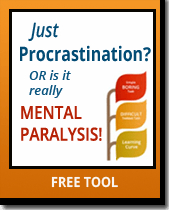
Without a strategy, distraction will defeat your best intentions
The most complex problems facing many ADD / ADHD college students are ones that stem purely from ADD-tendencies and habits. They usually fall into buckets of what I call the “4 D’s”: Disorganization, Denial, Distraction and Derailment.
Although distraction causes particular problems in college, it is likely to dog you throughout your life as well. And good study skills may be needed at any age. Many professionals need advanced certifications or credentials that require intense or independent study. With ADHD, it’s just as easy to get distracted at 40 as it is at 20.
Since some of the conditions that help us focus with ADD / ADHD run counter-intuitive to conventional wisdom, you should have an anti-distraction strategy that’s tailored to you.
What's Your ANTI-DISTRACTION Study Strategy?
Any time the concepts of focus and distraction come into play, it's a good bet that properly prescribed medication will help. But with or without medication, strategy plays a vital part in focusing on academic projects.
Environment – Get to your good place
As a college student, I had no idea I had ADD. But I did know that I was able to concentrate very well in the cafeteria of the student union. It didn’t matter that it was crowded or noisy. As long as I had a table. I could hunker down there and be oblivious to everything around me for hours. Conversely, I found it almost impossible to concentrate in my dorm room. I doubt if my desk there was ever used.
It’s critical to be able to study in your own kind of optimal environment. For non-ADD people, this may be a quiet desk or library. But most people with ADD / ADHD find it easier to focus in a place with more stimulation. This might be the student cafeteria, a particular Starbucks, a commuter train, or a park bench.
Background Stimulation – Quiet may be deadly!
When you were a kid, did you do your homework best with the TV on? Maybe you need to hear the radio in the background, or have a certain kind of music. Figure out what you need to achieve your best focus. It’s probably a different type of stimulation for math or memorization than for reading and writing. Whatever it is, if you don’t have it, your mind is more likely to wander.
Body Double – Study with a friend
You may find that your concentration heightens if someone else is in the room, but not interacting with you. If so, recruit a friend to be your study buddy. Just be clear about the rules: if that person is talking on their phone or chatting to you, it defeats the purpose!
Your Wandering Mind – How to keep it reined in
Many ADD / ADHD Adults find the biggest distraction of all comes from their own wandering mind. Random thoughts come in at any time, triggered by the study material, your own rumination, … or a squirrel outside the window. Internet access makes it even easier to go down the rabbit hole. If this sounds like you, you could set a timer app to ping or vibrate at particular intervals throughout your study period; for example, every 15 minutes. This can serve to pull your mind back and get back on track.
Manage Expectations – You are NOT available
Every time your focus is pulled by a call, text or email, it takes a person, on average, more than 20 minutes to get back to the same level of flow or concentration. If you’re engaged in communication on your device while studying or working, you never get into a state of focus at all. So your brain is simply going through the motions of study, without retaining much. That paper you’re trying to write will take you much longer, with more errors.
It isn’t brain science to figure it out: shut off your phone or email notifications! If a family member is frantic that they can’t reach you, let them know that you turn off your phone when studying or working. Then you can spend less time studying, and more real time with others when you can relax and enjoy it.
In the next post, I’ll talk about the 4th “D,” those things that DERAIL you.





lm
” If a family member is frantic that they can’t reach you, let them know that you turn off your phone when studying or working. ”
There are some family members who aren’t willing to leave you alone about this, and equally unwilling to admit that what they’re doing is actually sabotage.
I wasn’t able to succeed at getting my professional certifications till a friend who’d been in my study group in grad school told me how she’d done it (non-ADHD, so she got hers before I got mine) — she suggested I leave the house (I was working and living at home) and go where I couldn’t be found, and if there was a real emergency, the family member who was having it was to contact her, and she would contact me. Funnily enough, there weren’t any “emergencies” during that time period, and I succeeded in getting two certifications back to back.
If there is undiagnosed ADHD in the generation before you – in part because they “didn’t believe in it” back then — that can add additional complications that even ADHD experts sometimes don’t address.
Bonnie Mincu
Being “unfindable” sounds like an essential strategy under the circumstances. For those of us who remember the ancient days before cell phones, the idea of parents expecting to be in constant contact with their college-age kids is strange. I went to college out of state and my parents called once a week… and kept the call short because of the long distance charges. Most of the other kids in my dorm marveled at how “close” I was with my mother. They didn’t even talk once a week to their parents, and that was normal in those days. Going away to school was supposed to be a rite of passage to adulthood, and that meant cutting the apron strings.
This thought is not for kids only! One can apply the same reasoning to a partner or spouse who interrupts study with unnecessary calling and texting.
annonym
Very helpful article, which reasonates aswell as providing practical advice.
Another trick I found to be super helpful:
As deadlines appear, adrenaline naturally pushes focus (procrastination reasoning).
Setting own deadlines earlier or peer pressure deadlines (meeting with supervisor etc) definetelly helps tricking into “flow state” alot before it’s almost to late (real procrastination).
This also helps with breaking bigger parts into chunks (part goals with supervisor instead the big big project altogether and without feedback).
Remember nts typically write tasks for neurotypical people as well and dont have the adhd brain in mind- so communicating with the person who values your work is a plus in many ways.
Bonnie Mincu
Absolutely! Setting milestone deadlines to show your work to a professor or supervisor can be especially helpful in breaking up the project, providing accountability and getting valuable feedback.
Sidney Wilson
Thank you! Really useful!
Most of my learning problems arise precisely because of my frequent distractions.
In fact, it doesn’t really help me to study with someone in pairs, I like to do everything myself. But I find the idea of setting time intervals extremely useful for me – it focuses on one topic and I concentrate at least 15-20 minutes on it. This minimizes the risk that I will be distracted by other thoughts or go looking for something else on the Internet.